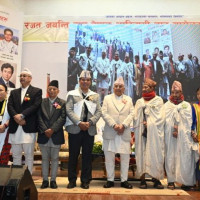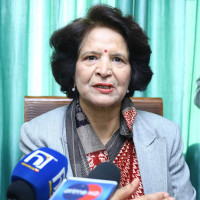- Monday, 9 February 2026
Climate change calls for global cooperation: PM
Chandragiri, May 23: Prime Minister Pushpa Kamal Dahal ‘Prachanda’ has said that mountains played a pivotal role in the global climate system, maintaining the global temperature and serving as water towers for billions of people living in the mountains and downstream, including coastal areas.
Inaugurating a two-day International Expert Dialogue on Mountains, People and Climate Change that started on Wednesday, Prime Minister Prachanda said, “Mountains are invaluable natural assets. These regions are home to 15 per cent of the global population and nearly half of its biodiversity hotspots host a wide variety of flora and fauna and communities with different languages, cultures, and traditions.”
Prime Minister Prachanda said that the impact had intensified snow and glacier melt across mountainous regions, altering water availability and increasing extremes. This severely threatens water security and heightens the risk of disasters, impacting millions dependent on these water sources and both upstream and downstream countries.
The Prime Minister further said that climate change had remained a grave concern for us who are experiencing the perils of our pristine natural resources. “The warming rate is disproportionately higher in the mountains than the adjoining plains. Projections alert us that the average temperature increase in the mountains will be over 1.8 degrees Celsius by 2050 while we are discussing to limit global temperature to 1.5 degrees Celsius by the end of this century,” he said.
Glacial lake outburst floods (GLOFs) are perennial threats in Nepal and other mountain countries. On current emissions pathways, 80 per cent of glaciers’ current volume will be gone by the end of this century, he said.
According to Prime Minister Prachanda, “The mountain economy is heavily reliant on climate-sensitive sectors like agriculture, tourism, hydropower, and physical infrastructure, and mountain communities and ecosystems have the worst climate impacts. Climate-induced disasters and other impacts are severely affecting mountain livelihoods resulting in degradation of resources, declining production and productivity, and a displacement of people, their culture, heritage, knowledge, and practices,”
Climate change is differentially impacting those poor, women, indigenous and disadvantaged communities, who primarily depend upon weather-based livelihoods, and have limited information, resources, and capacity to cope with the changes, the Prime Minister said.
Prime Minister Prachanda further said, “Our collective journey towards recognition of mountains has yielded positive results. COP 28 presented a crucial opportunity for nations to come together and reaffirm their commitment to ambitious climate action. Let me recall our collective success in establishing the mountain agenda at COP 28 through the high-level roundtable on “Call of the Mountains’ hosted by Nepal.”
“Let me reiterate the recent reports of the Intergovernmental Panel on Climate Change (IPCC), which indicate that climate change's impact on mountains is unprecedented. It is evident that occupying the front lines of the global climate crisis, mountainous countries are disproportionately burdened by the adverse effects of warming,” he added.
Prime Minister Prachanda further said that the urgency of limiting warming to 1.5 degrees Celsius must be complemented by a focus on regional and global cooperation to enhance mountain people’s well-being, boost ecosystem diversity, stability, and sustainability, and identify sustainable development options that consider local requirements.
“I have strongly highlighted these issues in all national and global forums including the 78th UNGA and the Climate Ambition Summit. Nepal is also championing this agenda in different international forums as the chair of the Group of Least Developed Countries (LDCs),” he added.
According to the Prime Minister, realising the urgency to prompt action to deal with climate change on mountains, we have organised this international dialogue. “I expect that this platform provides us the opportunity to collaborate, share knowledge, and forge partnerships for collective progress to make meaningful strides in addressing the climate crisis and securing a better world for generations to come.”
This expert dialogue is not just an event but a strategic initiative that aims to strengthen, coordinate, and prioritise mountain-based actions in the context of climate change and encourage mountain countries and agencies to collaborate on UNFCCC mountain work programmes and mandates, Prime Minister Prachanda said.
This discourse should allow governments and stakeholders in mountainous countries and their allies to better understand mountain climate concerns and solutions, share expertise and experience, and enable synergies. More crucially, the dialogue aims to produce concrete roadmaps and strategies for mountains at the experts’ dialogue on mountains and climate change in the SBSTA 60th session next month and beyond.
“We must not forget the significance of synergetic collaborations among the LDC Group, G-77, China, and other climate negotiation groups of the UNFCCC,” he added.
He also asked international delegates to join the collective efforts to protect and promote the mountains, mountain civilisations, mountain ecosystems, and inhabitants of mountains and seek to garner collaboration and solidarity to tackle the common challenges posed by climate change in the mountains.
Speaking at the programme, Deputy Prime Minister and Foreign Minister Narayan Kaji Shrestha has drawn attention to mitigating the problems caused by climate change to ensure the protection of the Earth. He said that the Himalayas were severely affected by climate change, leading to the melting of snow, and stressed the necessity of joint efforts to reduce such problems.
He said that the rising global temperatures could exacerbate climate change issues, and focused on the need to limit the temperature increase to 1.5 degrees Celsius.
"The problems brought by climate change are likely to escalate further. This has a greater impact on the Himalayan region, making life there even more difficult. Therefore, the global community must unite in efforts to stop the temperature rise.”
Similarly, speaking at the inaugural session, Saber Hossain Chowdhury Minister of Environment, Forest and Climate Change of Bangladesh, said that although the Hindu Kush Himalaya had a negligible role in causing climate change, countries like Nepal and other Himalayan nations were suffering the most. He said that it was crucial to engage in serious dialogue with the global community on this issue without delay.
He said, “If the mountains are healthy, the entire universe is healthy. If there are problems in the mountains, there will be problems all over the universe. It is high time the global community understood this. We must lobby effectively on this matter. If Nepal leads, Bangladesh is ready to join hands.”
Minister Chowdhury further said, "We have been pointing out the problems in the mountains. Now, we must also tell those who created these problems to provide solutions. We need to be able to offer solutions ourselves. We have already suffered significant losses.”
During the programme, Minister of Agriculture and Environment of Bhutan, Yeshey Penjor, expressed concern over recent activities that were devastating the Himalayan economy. He said, "Our mountains may no longer remain white but are increasingly likely to turn black. If the temperature continues to rise at the current rate, the mountains might lose their snow.”
Climate expert Rosa Laura Romeo, addressing the programme, said that sustainable development in Himalayan regions like Nepal was currently the paramount agenda. She pointed out that the impacts of climate change disproportionately affected the poor, disadvantaged, indigenous, and tribal communities, necessitating a robust advocacy for climate justice.
She highlighted the direct connection between mountainous and coastal countries, stressing the importance of collaboration between Himalayan nations and larger economies to mitigate the effects of climate change.
The dialogue, spanning two days, will feature the participation of 65 scientists, climate change experts, and researchers from 23 countries. The event will encompass technical sessions on nine thematic topics, including Climate Change and Sustainable Development, Science and Evidence on Climate Change Impact, Vulnerability and Risks, and Emerging Threats and Crisis in the Mountains: Loss and Damage.
According to climate change Expert Dr. Maheshwar Dhakal, Joint Secretary of the Ministry of Forests and Environment, the dialogue would conclude with the issuance of the Kathmandu Declaration.
















